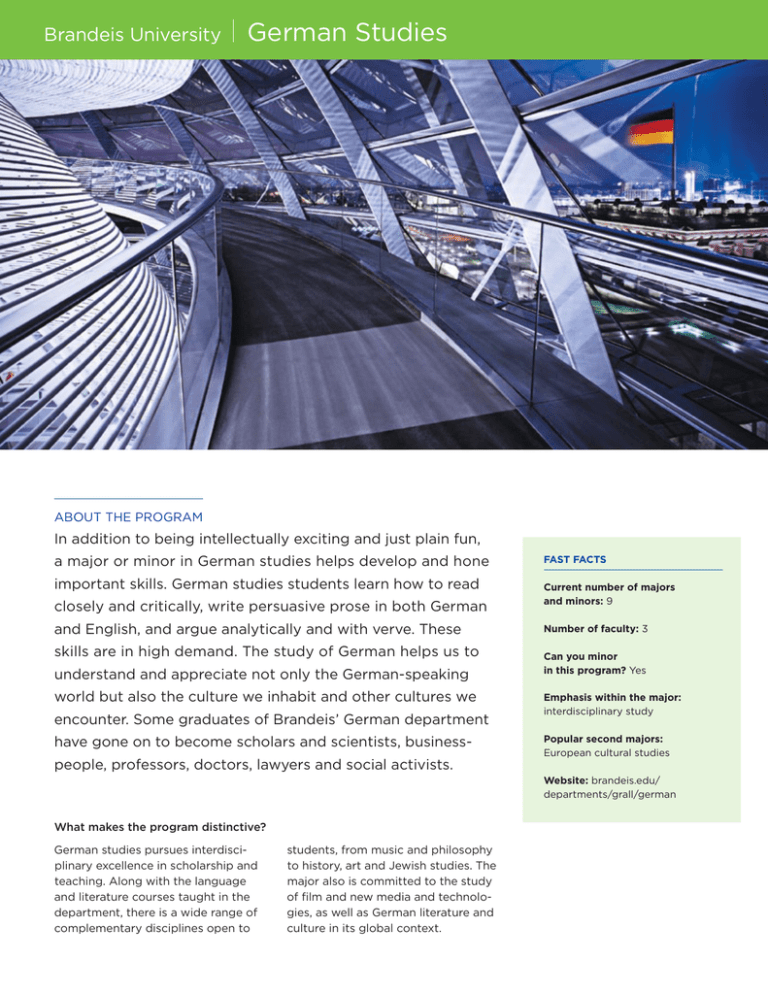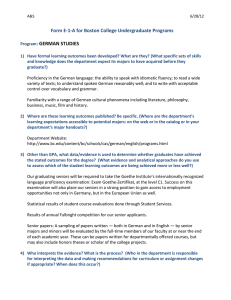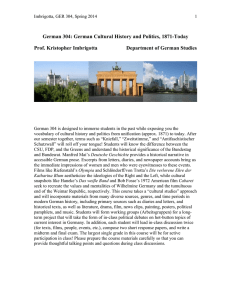German Studies Brandeis University
advertisement

Brandeis University German Studies about the program In addition to being intellectually exciting and just plain fun, a major or minor in German studies helps develop and hone important skills. German studies students learn how to read closely and critically, write persuasive prose in both German and English, and argue analytically and with verve. These skills are in high demand. The study of German helps us to understand and appreciate not only the German-speaking world but also the culture we inhabit and other cultures we encounter. Some graduates of Brandeis’ German department have gone on to become scholars and scientists, businesspeople, professors, doctors, lawyers and social activists. fast facts Current number of majors and minors: 9 Number of faculty: 3 Can you minor in this program? Yes Emphasis within the major: interdisciplinary study Popular second majors: European cultural studies Website: brandeis.edu/ departments/grall/german What makes the program distinctive? German studies pursues interdisciplinary excellence in scholarship and teaching. Along with the language and literature courses taught in the department, there is a wide range of complementary dis­ciplines open to students, from music and philosophy to history, art and Jewish studies. The major also is committed to the study of film and new media and technologies, as well as German literature and culture in its global context. Brandeis University | German Studies Academics and Research Course offerings Recent courses in the German studies major include “German Literature, Music and Film,” “Renaissance Art in Northern Europe,” “Hitler’s Europe in Film,” “From Rapunzel to Riefenstahl: Real and Imaginary Women in German Culture,” “Franz Kafka,” “Reformation Europe (1400-1600),” “The Music of Johann Sebastian Bach” and “Schopenhauer and Nietzsche: Art and Politics.” The Center for German and European Studies Professor Sabine von Mering directs the German Center at Brandeis. It hosts lectures from visiting scholars and offers students a variety of opportunities, including travel and research grants. The Mandel Center for the Humanities This exciting new center offers interdisciplinary undergraduate courses that attract students from all majors in the humanities and beyond. The center also hosts special local, national and international conferences and events. Interdisciplinary study The interdisciplinary major enables students to focus on German courses in many different departments. You can study Kant in the philosophy department, Wagner or Beethoven in the music department, or German-Jewish thought in the Near Eastern and Judaic studies department. The German department itself emphasizes literature and film, from Kafka and Goethe to Riefenstahl and the latest German-Turkish filmmakers. Beyond the Classroom Study abroad German majors and minors have the opportunity to spend a summer or semester studying in another country. The Freie Universität Berlin and the University of Freiburg have been favorite choices in the past. Why study German? The German language remains a crucial language for the study of philosophy, poetry, music, literature, theology and the arts. Learn more about Luther and the Brothers Grimm; Goethe, Marx, Nietzsche and Kafka; Mann, Brecht and Freud; and Mozart, Bach, Beethoven, Schubert, Brahms and Schumann. Wagner spoke and wrote German, as did Weber, Einstein, Heisenberg, Kant, Hegel, Schopenhauer and Heidegger. Moreover, Germany remains the European powerhouse of science, engineering and technology. The knowledge of German is a key that unlocks many doors. Awards and Recognition Senior thesis German majors may pursue honors by writing an essay or thesis in their senior year. Departmental honors are awarded on the basis of excellence in all courses applied to the major, as well as the essay or thesis. “I began taking German only to satisfy the language requirements, but by the end of my After Brandeis first semester I had fallen in Career opportunities German majors have gone on to graduate school in German literature to prepare for careers in teaching and research, and they have pursued professional degrees in law, medicine and business. They also have entered government work or secured jobs in publishing companies and business firms with international connections. love with the program. The Graduate study Katherine Deeg ’06 writes, “My experience as an undergraduate student in the German department was truly life-changing. The department’s excellent faculty and innovative curriculum improved my written and spoken German immeasurably and deepened my understanding of both German and European culture. Since graduating, I decided to pursue a scientific career and earned an ScM in biology in 2010. Currently, I am enrolled in an MA program to study the history of science in East Germany. It is a testament to the strength, character and quality of the professors in the German department that I felt I was able to make this transition.” classes and the professors were so amazing and interesting that I never felt like I was taking a class because I had to — and I cer­tainly did not mind spending a semester in Berlin. I have never had more fun learning a language!” Keara DeKay ’08 Office of Communications ©2016 Brandeis University G067


